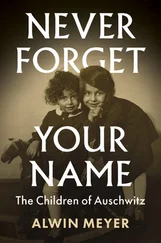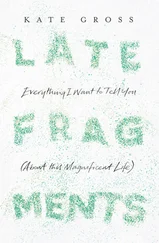And James? What had he thought of her? He would never tell her this, would never admit it to himself: he had not noticed her at all, that first lecture. He had looked right at her, over and over, as he held forth on Roy Rogers and Gene Autry and John Wayne, but when she came to his office he had not even recognized her. Hers had been just one of the pale, pretty faces, indistinguishable from the next, and though he would never fully realize it, this was the first reason he came to love her: because she had blended in so perfectly, because she had seemed so completely and utterly at home.
All through the second lecture, Marilyn remembered the smell of his skin — clean and sharp, like the air after a rainstorm — and the feel of his hands at her waist, and even her palms grew warm. Through her fingers, she watched him: the tip of his ballpoint tapping the top of the podium, the deliberate flick as he turned over another page of his notes. He looked everywhere but toward her, she realized. At the end of the hour, she dawdled in her seat, slowly slipping her papers into her folder, tucking her pencil into the pocket. Her classmates, hurrying to other courses, squeezed past her into the aisle, jostling her with their bags. At the podium, James sorted his notes, dusted his hands, replaced the chalk on the blackboard ledge. He didn’t look up when she stacked her books, or when she tucked them in the curve of her arm and headed toward the door. Then, just as her hand touched the knob, he called, “A moment, Miss Walker,” and something inside her jumped.
The classroom was empty now, and she leaned against the wall, trembling, while he closed his briefcase and descended the steps of the platform. She curled her fingers around the doorknob behind her to hold herself in place. But when he reached her, he wasn’t smiling. “Miss Walker,” he said again, taking a deep breath, and she found that she wasn’t smiling either.
He was her teacher, he reminded her. She was his student. As her teacher, he would feel he was taking advantage of his position if they were — he looked down, fiddling with the handle of his briefcase — if they were to develop any kind of relationship. He wasn’t looking at Marilyn, but she didn’t know. She was looking down at her feet, at the scuffed toes of her shoes.
Marilyn tried to swallow and couldn’t. She concentrated on the gray scratches against the black leather and steeled herself by thinking of her mother, all those hints about meeting a Harvard man. You weren’t here to find a man, she told herself. You were here for something better. But instead of the anger she hoped for, a hot ache swelled at the base of her throat.
“I understand,” she said, looking up at last.
The next day, Marilyn came to his office hours to tell him that she’d dropped the class. Within a week they were lovers.
They spent all autumn together. James had a seriousness, a reserve, unlike anyone she had met before. He seemed to look at things more closely, to think more carefully, to hold himself a half step apart. Only when they came together, in his tiny Cambridge apartment, did that reserve drop, with a fierceness that made her catch her breath. Afterward, curled up on his bed, Marilyn ruffled his hair, spiky with sweat. For those afternoon hours, he seemed at ease with himself, and she loved that she was the only thing that made him feel that way. They would lie together, dozing and dreaming, until six o’clock. Then Marilyn slipped her dress back over her head, and James buttoned his shirt and combed his hair again. His cowlick would stand up at the back, but she never told him, loving that little reminder of the side only she got to see. She simply kissed him and hurried back for evening sign-in at the dormitory. James himself began to forget about the cowlick; after Marilyn left, he seldom remembered to look in the mirror. Every time she kissed him, every time he opened his arms and she crawled into them, felt like a miracle. Coming to her made him feel perfectly welcomed, perfectly at home, as he had never in his life felt before.
He had never felt he belonged here, even though he’d been born on American soil, even though he had never set foot anywhere else. His father had come to California under a false name, pretending to be the son of a neighbor who had emigrated there some years earlier. America was a melting pot, but Congress, terrified that the molten mixture was becoming a shade too yellow, had banned all immigrants from China. Only the children of those already in the States could enter. So James’s father had taken the name of his neighbor’s son, who had drowned in the river the year before, and come to join his “father” in San Francisco. It was the story of nearly every Chinese immigrant from the time of Chester A. Arthur to the end of the Second World War. While the Irish and the Germans and the Swedes crowded onto steamship decks, waving as the pale green torch of the Statue of Liberty came into view, the coolies had to find other means to reach the land where all men were created equal. Those who made it would visit their wives in China and return each time celebrating the birth of a son. Those at home in the villages who longed to make their fortunes would adopt the names of those mythical sons and make the long journey across the sea. While the Norwegians and the Italians and the Russian Jews ferried from Ellis Island to Manhattan, fanning out by road and railway to Kansas and Nebraska and Minnesota, the Chinese who bluffed their way to California mostly stayed put. In Chinatowns, the lives of all those paper sons were fragile and easily torn. Everyone’s name was false. Everyone hoped not to be found out and sent back. Everyone clustered together so they wouldn’t stand out.
James’s parents, however, had not stayed put. In 1938, when James was six, his father received a letter from a paper brother who had gone east looking for work when the Depression began. He had found a place at a small boarding school in Iowa, the “brother” wrote, doing groundswork and maintenance. Now his (real, nonpaper) mother was ill and he was returning to China, and his employers wondered if he had any reliable friends who might do as good a job. They like the Chinese, the letter said; they feel we are quiet and hardworking and clean. It was a good position, a very exclusive school. There might be a job for his wife in the school kitchens. Would he be interested?
James could not read Chinese but all his life he held the memory of the letter’s last paragraph, a scrawl of fountain-pen calligraphy, which caught his parents’ attention. There was a special policy, said the brother, for children of employees. If they could pass an entrance exam, they could attend the school for free.
Jobs were scarce and everyone was hungry, but it was because of this paragraph that the Lees sold their furniture and moved across the country with two suitcases between them. It took five Greyhound rides and four days. When they reached Iowa, James’s “uncle” took them to his apartment. James remembered only the man’s teeth, more crooked even than his father’s, one tooth turned sideways, like a sliver of rice waiting to be toothpicked out. The next day, his father put on his best shirt, buttoned up to the collar, and went with his friend to Lloyd Academy. By afternoon it was settled: he would start the following week. The morning after that his mother put on her best dress and went with his father to the school. That evening, each brought home a navy-blue uniform stitched with a new English name: Henry. Wendy.
A few weeks later, James’s parents brought him to Lloyd for the entrance exam. A man with a large white mustache like cotton brought him into an empty classroom and gave him a booklet and a yellow pencil. Looking back, James realized what a brilliant idea it was: what six-year-old would be able to read, let alone pass, such an exam? A teacher’s son, perhaps, if she had studied with him. Surely not a janitor’s son, or a cafeteria lady’s son, or a groundskeeper’s son. If a square playing field is forty feet on a side, how long is the fence that goes around it? When was America discovered? Which of these words is a noun? Here is a sequence of shapes; which shape completes the pattern? We’re sorry, the principal could say. Your son didn’t pass the test. He isn’t up to Lloyd academic standards. And no tuition would be necessary.
Читать дальше












